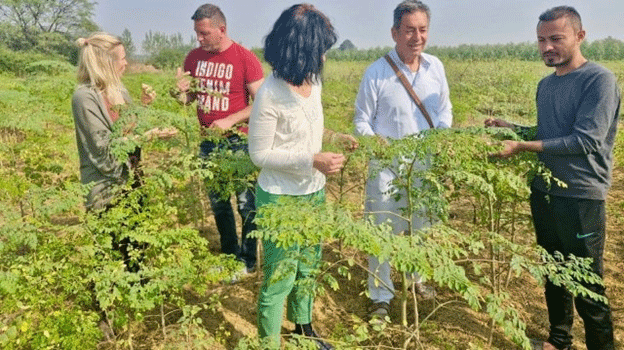In Ratnana village, located in Punjab’s Shaheed Bhagat Singh Nagar district, Dr. Pankaj Kumar has successfully broken away from the state’s traditional wheat-paddy farming cycle by cultivating Moringa Oleifera, commonly known as the drumstick or miracle tree. Through his initiative, Pankaj has not only introduced sustainable farming methods but has also made a significant mark on the global stage by exporting premium moringa powder worth between Rs 1 crore to Rs 1.5 crore annually to Germany. This achievement highlights the potential for agricultural diversification in Punjab and underscores the value of organic farming in meeting international standards.
Pankaj’s journey began in 2022 when he leased 8.5 acres of land for Rs 6 lakh annually. Inspired by his collaboration with German businessman Harald Seibel, Pankaj ventured into moringa cultivation through his company, Vela Cell India. Harald, who had been sourcing moringa from the area since 2018, motivated Pankaj to take over the operations, turning his focus from yoga instruction and naturopathy to sustainable farming. The success of their partnership demonstrates the global appeal of organic, high-quality agricultural products.
Pankaj cultivates a high-density variety of Moringa, which grows to a manageable height of 3-4 feet, allowing for the exclusive harvest of leaves, the most nutrient-rich part of the plant. These leaves are processed into high-quality green moringa powder that is sold in Germany. The meticulous process involves maintaining organic standards, with certification under the National Programme for Organic Production (NPOP) and the European Union (EU) standards. Each batch is tested in government-approved laboratories to ensure quality and compliance. The moringa leaves are washed in saline water within 30 minutes of harvesting to preserve nutrients, dried at controlled temperatures, and then processed into powder at a local facility.
The yield from Pankaj’s moringa plantation is impressive, with an acre producing between 500 and 700 kg of powder annually, valued at Rs 10,000 to Rs 12,000 per kg. This not only generates substantial revenue but also provides a viable alternative to traditional crops like wheat and paddy. By focusing solely on leaf production and avoiding the taller moringa trees that produce drumsticks, Pankaj ensures that each harvest is nutrient-dense, maximizing the health benefits for his customers.
Pankaj also grows other medicinal plants on his farm, including ashwagandha, brahmi, and black turmeric. He uses organic pest control methods like garlic and chili paste, and relies on cow dung for fertilization. Pankaj manages stubble from nearby paddy fields as mulch to retain soil moisture and control weeds. His farm also features a Rs 20 lakh processing unit, where he employs both permanent and seasonal workers for leaf picking and processing. Pankaj’s innovative farming techniques not only promote sustainable agriculture but also highlight the profitability of niche crops like moringa, which can command higher market prices.
Pankaj’s efforts have not gone unnoticed, as Harald Seibel, Pankaj’s partner in the export business, praised the quality of moringa produced in Punjab. Seibel’s German team conducts regular inspections to ensure the highest standards are maintained. “The demand for organic products is substantial, and the meticulous processes implemented here in Punjab are meeting those standards,” Seibel stated. This collaboration not only brings valuable foreign exchange to the region but also promotes sustainable farming practices among local farmers.
In conclusion, Dr. Pankaj Kumar’s initiative in Nawanshahr serves as a model for how farmers can diversify their crops and access global markets. By breaking away from the traditional wheat-paddy cycle and embracing organic and sustainable farming methods, Pankaj has set a precedent for others in Punjab and beyond. His story demonstrates the potential for niche crops like moringa to provide significant income opportunities for farmers, while also contributing to global food security and health.
Error




